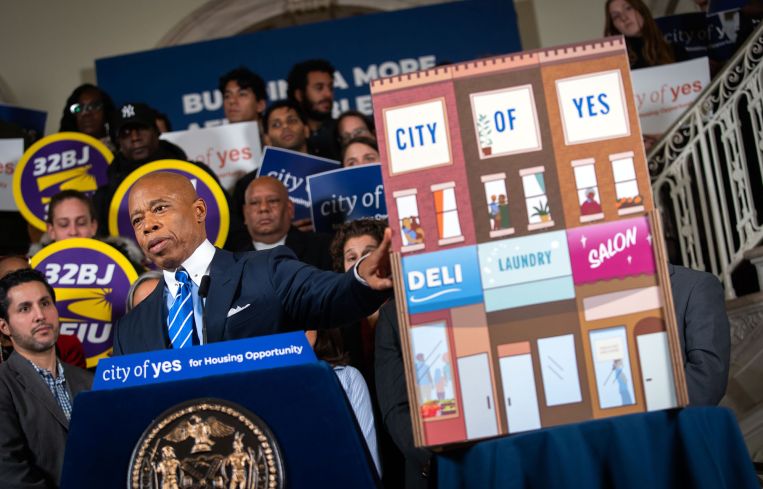Lawmakers, Community Groups Try to Overturn Adams’s City of Yes Initiative
By Isabelle Durso March 26, 2025 5:56 pm
reprints
Community groups and conservative New York City Council members want to turn the City of Yes into the City of No.
The opponents filed a lawsuit Tuesday in Staten Island Supreme Court arguing that Mayor Eric Adams’s administration and the City Council failed to conduct a proper review of the impacts of the zoning changes that will take place under City of Yes for Housing Opportunity, a land-use reform that is expected to clear a path for 80,000 new homes in the city over the next 15 years.
The suit claims the administration “cast aside critical areas of environmental concern in their rush to complete the most comprehensive and radical transformation of New York City zoning in over 60 years.”
“The rezoning represented a wholesale departure from long-standing public policy that respects open space, air and light, stress on infrastructure, and the neighborhood character of vast areas of New York City’s low-density communities,” the group wrote in the filing.
As a result, the suit’s plaintiffs — which include the City Council’s conservative “Common Sense Caucus” members Robert Holden, Vickie Paladino, Joann Ariola and David Carr — have requested “a nullification of respondents’ unlawful behavior,” according to the suit.
“The City of Yes was never really about solving the economic or housing crisis,” Ariola told The Real Deal. “It was about clearing the decks for big developers to come into our communities and deceive us into thinking it would not have a negative impact on our communities or a negative environmental consequence.”
The New York City Council voted 31 to 20 to approve the City of Yes zoning text amendments on Dec. 5, 2024. The Adams administration has insisted that City of Yes is “the most pro-housing zoning proposal” in the city’s history.
“It is game-changing work that will deliver unprecedented, equitable change to our housing crisis by building more housing in every neighborhood … and investing $5 billion toward critical improvements,” a spokesperson for City Hall said in a statement. “When it comes to housing, there will always be those who say ‘Not in my backyard,’ but we stand by the city’s thorough and transparent review process and will address any lawsuit when it is received.”
A spokesperson for the City Council did not immediately respond to a request for comment.
A successful challenge to City of Yes would require all three zoning changes under the initiative — including City of Yes for Carbon Neutrality and City of Yes for Economic Opportunity — to be repealed, TRD reported, citing attorney Jack Lester, who is representing the plaintiffs.
However, Paul Selver, co-chair of the land use department at Kramer Levin, told Commercial Observer “the underlying problem with [the plaintiffs’] analysis is the City of Yes rezonings are all dealing with different concepts and different areas of concern under the zoning.”
“They made very general claims of inadequacy, and they made a very general claim that the city didn’t properly look at alternatives in mitigation,” Selver added.
The sweeping overhaul of the city’s outdated zoning rules is designed to boost housing production, and allows for the construction of three- to five-story apartment buildings near subway or rail stations, as well as two- to four-story housing above businesses, as CO previously reported.
“City of Yes is large and complex and was an attempt to address the lack of housing supply and a lot of complicated zoning issues that needed to be updated,” said Eldad Gothelf, senior vice president of real estate at lobbying firm Kasirer, which was involved in passing the legislation.
“It was intended to provide a clearer, easier way to provide more housing for current and future residents,” Gothelf added. “But change might be frightening for a lot of folks.”
Naysayers of the plan argued City of Yes would lead to the “Manhattan-ization” of the outer boroughs, TRD reported.
And many of the community groups named as plaintiffs in Tuesday’s filing are outer borough-based organizations, including the Queens Civic Congress, which is leading the suit. Manhattan-based Metropolitan Council on Housing is also listed as a plaintiff in the filing.
Despite the pushback, Adams has stayed firm in his support of City of Yes.
“We showed the nation that government can still be bold and brave by passing the most pro-housing piece of legislation in city history,” Adams said when the initiative was passed in December. “Our administration proposed and fought hard for this proposal for more than a year, and now New Yorkers are the ones who will benefit from lower rent.”
Despite changes made by the City Council that could curb where some of the new housing units are built, the real estate community and the Real Estate Board of New York have been in favor of the plan. REBNY President James Whelan previously told CO it was “the most significant rewrite of the zoning code since 1961, and it’s going to have a very good, beneficial impact for the city in the years and decades to come.”
“The landmark City of Yes zoning reforms underwent over a year of public review, engaging dozens of stakeholders and integrating a wide range of legal and community feedback before becoming law,” a spokesperson for REBNY said in a statement to CO. “Reversing this plan would move New York City in the wrong direction by closing pathways to desperately needed new housing within all five boroughs.”
Isabelle Durso can be reached at idurso@commercialobserver.com.



